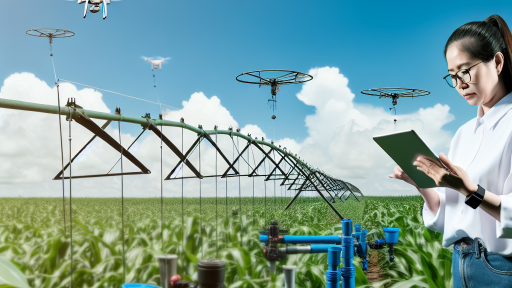Understanding Agricultural Land Use Permits
Types of Agricultural Land Use Permits
Agricultural land use permits come in various forms.
Primarily, they can be classified into zoning permits and environmental permits.
Zoning permits regulate how land is utilized within a specific area.
Environmental permits focus on the impact of agricultural practices on local ecosystems.
Consequently, each type serves a unique purpose in land management.
Requirements for Obtaining Permits
Obtaining agricultural land use permits involves specific requirements.
Firstly, applicants must submit a detailed land use plan.
This plan outlines intended agricultural practices and their potential impacts.
Moreover, environmental assessments may be necessary to identify ecological risks.
Additionally, local zoning laws must be reviewed and followed.
Compliance with these requirements ensures effective land management.
Application Process Overview
The application process for permits can be intricate.
Initially, applicants should consult with local agricultural departments.
This consultation provides guidance on specific local regulations and forms.
Next, submit the necessary documentation along with fees.
Transform Your Agribusiness
Unlock your farm's potential with expert advice tailored to your needs. Get actionable steps that drive real results.
Get StartedFollowing submission, the authorities conduct reviews and inspections.
Ultimately, applicants receive notification of approval or denial.
Potential Challenges
Securing agricultural land use permits can pose challenges.
Many applicants face lengthy approval processes.
Additionally, unexpected regulatory changes may affect applications.
Finally, meeting all legal and environmental standards requires diligent effort.
The Importance of Securing Permits for Sustainable Agriculture Practices
Understanding the Role of Permits
Securing permits is crucial for sustainable agriculture practices.
Permits ensure compliance with local regulations and environmental laws.
They promote responsible land use and conservation of natural resources.
Furthermore, obtaining permits can prevent legal issues in the future.
Benefits of Permits in Agriculture
Permits provide structure to farming operations.
They create accountability and transparency in agricultural practices.
Additionally, permits enhance community trust in farming operations.
Farmers can also access funding and support through permitted practices.
Environmental Considerations
Permits often require environmental impact assessments.
This process helps identify potential risks to local ecosystems.
By addressing these concerns, farmers can implement sustainable practices.
Consequently, the agricultural sector contributes to ecological preservation.
Navigating the Permit Process
Starting the permit process can seem daunting.
It is essential to research local regulations thoroughly.
Consultation with local authorities can simplify the journey.
Furthermore, engaging with agricultural extension services may provide guidance.
Case Studies of Successful Permit Implementation
Many farms illustrate the benefits of secured permits.
For example, Green Acres Farm improved its irrigation system through permits.
Showcase Your Farming Business
Publish your professional farming services profile on our blog for a one-time fee of $200 and reach a dedicated audience of farmers and agribusiness owners.
Publish Your ProfileThis led to water conservation and enhanced crop yields.
Similarly, Sunny Fields implemented eco-friendly practices after securing their permits.
Their success fosters a positive community perception of agriculture.
Step-by-Step Guide to Applying for Agricultural Land Use Permits
Understanding the Importance of Permits
Securing permits for agricultural land use is crucial for compliance.
These permits protect natural resources and maintain land management standards.
Additionally, they promote sustainable agricultural practices.
Research Local Regulations
Begin your application journey by researching local laws.
Different regions may have varying requirements for agricultural permits.
Visit your local agricultural office for detailed information.
Gather Necessary Documentation
Compile all essential documents for your application.
This may include land ownership proofs and environmental assessments.
Furthermore, prepare detailed plans for your intended land use.
Key Documents to Include
- Land Title Deed
- Environmental Impact Assessment
- Site Plan and Layout
- Business Plan for Agricultural Activities
Prepare the Application Form
Fill out the application form completely and accurately.
Include all required information about the intended activities.
Double-check all entries before submission.
Submit Application and Fees
After preparing your application, submit it to the relevant authority.
Be prepared to pay application fees as required.
Keep a copy of the submitted application for your records.
Follow Up on Your Application
After submission, regularly check the status of your application.
Contact the issuing authority if you have questions or concerns.
Address Any Revisions or Requests
You may receive requests for additional information or changes.
Respond promptly and provide the required documents.
This keeps your application moving through the approval process.
Receive Your Permit and Comply with Regulations
Once approved, carefully review the issued permit.
Ensure you understand all conditions and requirements.
Maintain compliance to avoid penalties or revocation of the permit.
Discover More: Navigating Water Policies in Agriculture
Common Challenges in Obtaining Agricultural Permits
Complex Regulatory Frameworks
Navigating the regulatory landscape can prove daunting.
Many farmers find rules vary significantly by location.
In addition, overlapping regulations from different agencies can create confusion.
To simplify this, consider consulting with local agricultural experts.
They can help clarify which permits are necessary for your operations.
Environmental Concerns
Environmental regulations often add another layer of complexity.
These concerns can include water usage, biodiversity, and soil health.
Farmers must demonstrate their practices are sustainable.
Engaging with environmental consultants can facilitate compliance.
They provide valuable insights to meet regulatory requirements.
Public Opposition
Public opinion can significantly impact permit approval processes.
Community groups may oppose new agricultural developments.
Open communication is key in addressing these concerns.
Showcase Your Farming Business
Publish your professional farming services profile on our blog for a one-time fee of $200 and reach a dedicated audience of farmers and agribusiness owners.
Publish Your ProfileFarmers should engage the community through informational meetings.
Highlighting the benefits of agricultural practices can alleviate fears.
Incomplete Applications
Submitting incomplete permit applications is a common mistake.
This can lead to delays and costly resubmissions.
Farmers should carefully review all requirements before applying.
Additionally, employing a checklist can ensure thoroughness.
Consulting with experienced professionals can enhance application quality.
Time Constraints
Obtaining permits often requires significant time investment.
Farmers frequently struggle to balance these demands with daily operations.
Planning ahead can mitigate time-related issues.
Setting aside dedicated time for permit applications is advisable.
Moreover, utilizing project management tools can help track progress.
Lack of Knowledge
A general lack of understanding about permit processes can hinder progress.
Education and training play vital roles in overcoming this barrier.
Workshops and seminars can provide valuable insights for farmers.
Networking with fellow farmers can also offer practical advice.
Staying informed about local regulatory changes is crucial.
Find Out More: Navigating Organic Certification Audits
The Role of Local Governments in Issuing Agricultural Permits
Authority of Local Governments
Local governments play a crucial role in agricultural land use regulations.
They are responsible for issuing permits necessary for farming activities.
Furthermore, they enforce zoning laws that dictate land usage.
This authority helps manage environmental impact and land preservation.
Permit Application Process
The permit application process often involves several steps.
First, farmers submit an application with required documentation.
This may include land surveys and environmental assessments.
Next, local officials review the application for compliance.
Additionally, public notices may be published to solicit feedback.
Criteria for Permit Approval
Local governments assess applications based on specific criteria.
Environmental impact is a primary consideration.
They also evaluate how the proposed use aligns with zoning regulations.
Community needs and benefits are weighed during the decision process.
Challenges in Obtaining Permits
Farmers often face challenges when securing permits.
One common issue is navigating complex regulatory requirements.
Moreover, lengthy review processes can delay agriculture projects.
Another challenge includes potential opposition from community members.
Importance of Local Government Engagement
Engaging with local governments is essential for farmers.
It fosters understanding of regulatory expectations.
Moreover, collaboration can lead to more streamlined processes.
Building relationships with officials can also ease communication challenges.
Future Trends in Agricultural Permitting
Local governments are evolving their approach to permitting.
Showcase Your Farming Business
Publish your professional farming services profile on our blog for a one-time fee of $200 and reach a dedicated audience of farmers and agribusiness owners.
Publish Your ProfileTechnology is increasingly used to improve efficiency.
For instance, online applications can simplify submissions.
Furthermore, adaptive policies are being developed for sustainable practices.
Learn More: Future Trends In Organic Certification Rules

Best Practices for Ensuring Compliance with Permitting Regulations
Understanding Local Regulations
Familiarize yourself with local agricultural regulations.
Each municipality has its own set of permitting rules.
Understanding these regulations is crucial for compliance.
Consult local government offices for relevant information.
Review documents that outline agricultural land use regulations.
Preparing Application Materials
Gather all necessary documents for your application.
Prepare detailed land use plans that meet regulations.
Include environmental assessments if required.
Clearly outline the intended use of the land.
Provide data supporting your proposal’s compliance with regulations.
Engaging with Stakeholders
Engage with local agricultural organizations and experts.
Networking can provide valuable insights and resources.
Attend public meetings to understand community concerns.
Involve neighbors and local businesses in the planning process.
This collaboration can foster community support.
Submitting Your Application
Ensure your application is complete before submission.
Double-check that all forms are filled out accurately.
Submit your application to the correct local office.
Keep copies of all submitted materials for your records.
Following Up on Your Application
Regularly check the status of your application.
Be proactive in addressing any issues that arise.
Maintain open communication with permitting officials.
Respond promptly to any requests for additional information.
Adapting to Changes in Regulations
Stay informed of any changes to local regulations.
Regularly review agricultural best practices and compliance tips.
Attend workshops or training sessions on relevant topics.
Adapt your practices as needed to remain compliant.
Explore Further: Zoning Law Compliance for Family Farms
Exploring the Impact of Permits on Agricultural Productivity and Profitability
Understanding Agricultural Permits
Agricultural permits regulate how land is used for farming.
These permits ensure compliance with local, state, and federal regulations.
They contribute to sustainability in agricultural practices.
Moreover, permits play a critical role in protecting natural resources.
Impact on Agricultural Productivity
Permit requirements can directly affect farming efficiency.
They often dictate the types of crops that can be grown.
This, in turn, influences overall yields and farm output.
Furthermore, they may mandate certain farming practices that enhance productivity.
Showcase Your Farming Business
Publish your professional farming services profile on our blog for a one-time fee of $200 and reach a dedicated audience of farmers and agribusiness owners.
Publish Your ProfileFor instance, water management permits can improve irrigation efficiency.
Financial Implications of Permit Requirements
Securing permits involves various fees and costs.
These costs can impact a farm’s bottom line significantly.
Investment in permit compliance can lead to long-term financial benefits.
For example, adhering to environmental regulations can prevent fines.
Additionally, compliance may open up access to grants and subsidies.
Profitability and Market Access
Permits can enhance market opportunities for farmers.
Many buyers prefer sourcing from compliant agricultural producers.
Furthermore, having the necessary permits can improve a farm’s reputation.
This, in turn, attracts more customers and enhances profitability.
Challenges in Securing Permits
The process of obtaining permits can be complex and time-consuming.
Farmers often face bureaucratic hurdles that delay operations.
Additionally, navigating regulations can require expert advice.
Many farmers struggle with the costs associated with legal consultations.
Balancing Compliance and Production Goals
Farmers must balance the need for permits with production goals.
Maintaining compliance while maximizing productivity is essential.
This balance ultimately determines profitability in the agricultural sector.
With proper planning, farmers can navigate permit requirements effectively.
Future Trends in Agricultural Permits and Land Use Regulations
Evolution of Land Use Policies
Land use policies are adapting to meet modern challenges.
Governments are introducing more flexible frameworks.
These frameworks aim to support sustainable agricultural practices.
Moreover, innovative zoning regulations emerge as key tools.
Increased Attention to Environmental Sustainability
Environmental concerns are driving change in permit requirements.
Regulatory agencies emphasize eco-friendly practices more than ever.
Farmers must demonstrate sustainable land management techniques.
Consequently, eco-certifications gain importance and relevance.
Technological Integration in Permit Processes
Technology transforms how permits are acquired and managed.
Online platforms streamline the application process significantly.
Furthermore, geographic information systems enhance site evaluations.
This shift promotes efficiency and transparency in regulations.
Community Involvement and Stakeholder Engagement
Stakeholder engagement is becoming essential in the permitting process.
Local communities now play a crucial role in decision-making.
Engaging with residents helps address concerns about land use changes.
Additionally, feedback from stakeholders adds valuable insights.
Climate Change Adaptation Strategies
Climate change is influencing agricultural land use policies.
Regulators are increasingly encouraging adaptive farming methods.
Farmers may need to alter practices to maintain compliance.
As a result, training programs on climate resilience become vital.
International Standards and Global Collaboration
Global agricultural standards are impacting local regulations.
Countries are collaborating to align their practices accordingly.
Showcase Your Farming Business
Publish your professional farming services profile on our blog for a one-time fee of $200 and reach a dedicated audience of farmers and agribusiness owners.
Publish Your ProfileThis cooperation promotes best practices and knowledge sharing.
Consequently, farmers may need to adjust to international expectations.
Additional Resources
Siting Livestock Farms in Minnesota | Minnesota Department of …




